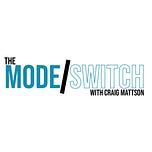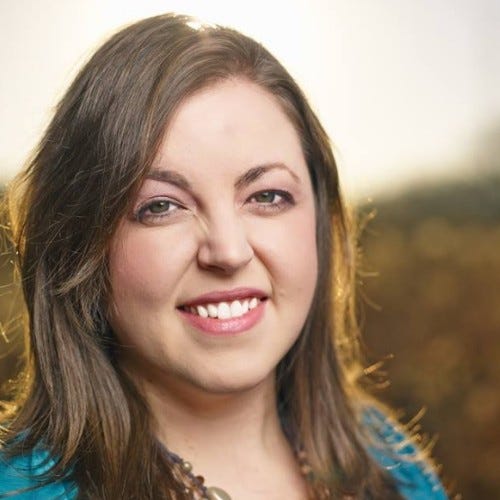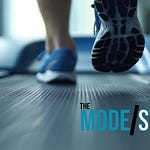Volume 1, Issue 9

I recently heard a compliment paid to two organizational leaders running a Chicago-based company called Highland Solutions. The praise ran something like this:
Most people, when they encounter human pain in a business meeting, pull back. They detach. But Jon and David, when they see pain, they go towards it. They draw close. They show care.
If you do a little poking around, you find that Jon and David’s therapeutic skills aren’t accidental: they used to be pastors. Their vocational formation runs deep in the art of people-care. These days, of course, it’s not just organizational leaders who need to share empathy. Early-career professionals, too, are called upon to practice a therapeutic expertise with their coworkers and clients.
Here’s a story about what I mean. Last summer, I interviewed Rachel Alvarado, an Account Director and Customer Success Leader at Milestone, Inc. Rachel and I were not alone in the studio. Check out the conversation at this link, and you’ll hear a lot of ambient sounds from her kids as well. Thanks to a highly sensitive SM7 microphone, you’ll also hear some—shall we say—urgent parental wisdom whispered by Rachel to the littler humans. But she is not too perturbed by a little chaos. She’s very good at emotional work, practicing maternal skills for whatever and whoever’s in front of her.
Rachel calls her clients her other children. She’s only half-joking: digital marketing customers are frequently overwhelmed, like kids who just bloodied their knees. Clients sometimes need someone to perform empathy in their direction: Everything’s going to be okay. Within the hour, your site will be back up and running. And maybe it’s okay to be down for a while. You’re running Bob’s Garage, after all, not Amazon Prime. Rachel’s good at this compassionate good humor. If you’re an early-career professional, you’ve probably had to get good at performing empathy as well.
But let’s ask an uncomfortable question: what happens when you run out of empathy in professional life?
As regular readers of The Mode/Switch know, I’ve spent a lot of time in the last few years researching spirituality in conditions of workplace overwhelm. I started with seasoned organizational leaders, but lately I’ve been turning to people in the first decade of their professional life. They’ve shared stories of how they’re called upon to do what sociologists call “affective labor” in everyday workplace life.
Here's the thing: affective labor has often been unfairly distributed in human life. In Victorian times, women and people of color were tasked with people-care in private spaces: they watched the kids, the elderly, the infirm. Today, an analogously unjust division of emotional labor shows up in workplaces. A Black professional, for example, may be hired for one position—only to find out, rather belatedly, that she’s also expected to be a sort of chaplain and therapist for people of color across the company. (Sometimes, as you learned in last week’s Mode/Switch, you can be asked to do pretty unpleasant affective labor, when a manager asks you to fire a coworker.)
Such experiences of inequity intensify my earlier question: What happens when you’ve run out of empathy—and you’re expected to perform it anyway?
The good news, I think, is that people-care doesn’t necessarily require performing empathy. Such emotional expression can be hugely helpful, of course! But you can also make a difference in your workplace with another form of affective labor. You can, in short, learn to see and circulate quiet gifts in your workplace community.
Hmm. That’s going to take some explanation. Let’s see here.
[Cue sound effect of brain wheels spinning as the researcher searches for an example.]
Let’s go back to Jon and David for a moment. During the summer of 2020, when Highland Solutions was going through a financially rough spot, Jon had a sort of unspiritual epiphany: what his employees needed from him was more than compassionate sounds made in their direction. What they needed was a sense that their work mattered.
Instead of asking therapeutic questions like “How are you doing?” Jon started asking, “How might we all give here?” (That’s not an exact quotation: you can read about this story more fully in my book Why Spiritual Capital Matters.) What the Highlanders could give, as it turned out, was a set of digital workshops offering instruction and consultancy to companies who needed to strengthen their research practices. This was a bold move. Highland was itself in severe financial straits. But Jon’s move to start a new life-giving project for his team also generated paying clients for the company, as you can hear in this podcast conversation.
Jon’s story shows a mode switch from performing empathy to resource attentiveness. I’m confident that Rachel’s can-do practicality would see the good in this move. But to clarify what we’re talking about, let’s turn to another early-career professional, an Australian named Melissa Clarke.
In our interview, she kept using a Down-Under expression that was startling to American ears: “We had to nut that out,” she would say and, “That was something we nutted out.” When I asked her about the phrase, she told me it means something like problem-solving discernment. Nutting it out means figuring it out.
I’d like to suggest that the same thing goes for resource attentiveness: you’re discerning what’s not immediately obvious on your team and in your circumstances.
Melissa told me about planning an information day for prospective students at the University of Sydney. At 6 AM on the day of the event, they were told that, for pandemic reasons, they’d need to shift to an online delivery mode. Melissa’s team was full of newbies, and she herself was a relatively young professional. But the team searched out what was needed for this big change. And they did it! Despite the changeableness of the moment, they discerned the unobvious gifts of their collegial community and made the shift. Melissa spoke with pride and satisfaction about their innovative approach on a day that might have gone very otherwise.
This week’s switch in modes commends a fresh kind of emotional work, one that’s less about empathy than about resilient watchfulness and hope. It’s about discerning gifts that you trust are there awaiting discovery and circulation among your coworkers. It doesn’t eliminate the need for compassion, of course: sometimes you’ll need to mode-switch back to empathy-sharing, like Rachel’s always doing with her clients. But other times, the most compassionate thing you can do is to search out gifts that move quietly among clients and coworkers in the generous overwhelm of everyday life and work.
Who I’m Learning From
The most provocative author I’m reading these days about affective labor is Lisa Feldman Barrett. I’m tempted to say that the Mode/Switch, week after week, should simply supply links to this wonderful and challenging book: How Emotions Are Made. Read this book! But if you’re looking for a runway into the Barrett’s findings, check out a 20-minute talk here.
Xs & Zs: An Intergenerational Lexicon

Let me take a cue from millennial Mode/Switch participant Melissa Clarke and go down under for our vocational lexicon for this week. You’ve already read the first term nutting out. In the U.S., almost anything about nutting has skanky connotations. Not so in Melissa’s world. But you’ve got that one. Here are two more:
Ever heard of hard yakka? Maybe not, but you’ve certainly done it! Hard yakka is tough work. So, the next time your manager gives you an unwelcome task, smile and say, “Sounds like hard yakka, boss!”
And then, there’s good on ya. That might sound like a compliment for a nice ‘fit. Like, that jacket looks good on ya. But in Australia, it’s a compliment for good work. It’s praise you can pull out of your backpack next time somebody does an especially good job on hard yakka.
The real cash value of these phrases at work is that when you run out of empathy, you don’t have to run out of Crocodile Dundee.
Enjoying The Mode/Switch? If you’re finding value in these interviews and the research behind them, share it with a friend! You’ll help this conversation grow and help me expand the scope of people I can interview and learn from. I’d be grateful. - Craig















Share this post